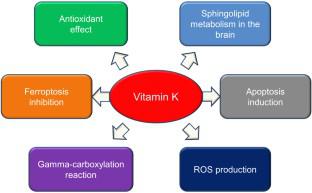Biochemistry (Moscow) ( IF 2.8 ) Pub Date : 2024-03-08 , DOI: 10.1134/s0006297924140049 Anna I. Diachenko , Igor A. Rodin , Tatiana N. Krasnova , Oleg I. Klychnikov , Lidia N. Nefedova

|
Abstract
Neurodegenerative diseases are a growing global health problem with enormous consequences for individuals and society. The most common neurodegenerative diseases, such as Alzheimer’s and Parkinson’s diseases, can be caused by both genetic factors (mutations) and epigenetic changes caused by the environment, in particular, oxidative stress. One of the factors contributing to the development of oxidative stress that has an important effect on the nervous system is vitamin K, which is involved in redox processes. However, its role in cells is ambiguous: accumulation of high concentrations of vitamin K increases the content of reactive oxygen species increases, while small amounts of vitamin K have a protective effect and activate the antioxidant defense systems. The main function of vitamin K is its involvement in the gamma carboxylation of the so-called Gla proteins. Some Gla proteins are expressed in the nervous system and participate in its development. Vitamin K deficiency can lead to a decrease or loss of function of Gla proteins in the nervous system. It is assumed that the level of vitamin K in the body is associated with specific changes involved in the development of dementia and cognitive abilities. Vitamin K also influences the sphingolipid profile in the brain, which also affects cognitive function. The role of vitamin K in the regulation of biochemical processes at the cellular and whole-organism levels has been studied insufficiently. Further research can lead to the discovery of new targets for vitamin K and development of personalized diets and therapies.
中文翻译:

维生素 K 在神经退行性疾病发展中的作用
摘要
神经退行性疾病是一个日益严重的全球健康问题,对个人和社会产生巨大影响。最常见的神经退行性疾病,例如阿尔茨海默病和帕金森病,可能是由遗传因素(突变)和环境(特别是氧化应激)引起的表观遗传变化引起的。维生素 K 是导致氧化应激发展的因素之一,它对神经系统有重要影响,它参与氧化还原过程。然而,它在细胞中的作用并不明确:高浓度维生素 K 的积累会增加活性氧含量的增加,而少量维生素 K 则具有保护作用并激活抗氧化防御系统。维生素 K 的主要功能是参与所谓的 Gla 蛋白的 γ 羧化。一些 Gla 蛋白在神经系统中表达并参与其发育。维生素 K 缺乏会导致神经系统 Gla 蛋白功能降低或丧失。据推测,体内维生素 K 的水平与痴呆症和认知能力发展中的特定变化有关。维生素 K 还会影响大脑中的鞘脂分布,从而影响认知功能。维生素 K 在细胞和整个生物体水平的生化过程调节中的作用尚未得到充分研究。进一步的研究可以发现维生素 K 的新靶点并开发个性化饮食和疗法。



























 京公网安备 11010802027423号
京公网安备 11010802027423号